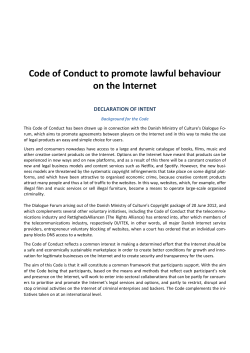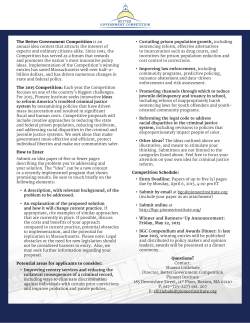
Criminal Record Screening Procedures
Criminal Record Screening Procedures Category: Human Resources 1. LEGISLATION/ENTERPRISE AGREEMENT/POLICY SUPPORTED Recruitment, Selection and Appointment Policy 2. IMPLEMENTATION PRINCIPLES 2.1. Criminal Record Screening is undertaken as part of the recruitment process to protect the staff, students, guests and assets of the University. 2.2. All staff and agency-hire staff should expect to be screened where the University deems it appropriate and practicable to do so. 2.3. A person who refuses to consent to criminal record screening, withdraws consent or fails to declare changes to their criminal history information, will be precluded from employment at the University. 2.4. A criminal record history or an outstanding charge will only preclude appointment at the University when the nature of the record prevents the individual from meeting the inherent requirements of the position. 3. PROCEDURAL DETAILS 3.1. Criminal Record Screening requirements Appointment at the University may be conditional upon undergoing criminal record screening through the University’s provider. 3.1.1. Where the University requires criminal record screening to be undertaken the Director, People and Culture, or nominee will provide written direction to the individual of the requirement to undergo criminal record screening. 3.1.2. Where the University requires criminal record screening to be undertaken through the National Police Checking Service (NPCS) the individual will provide the Director, People and Culture, or nominee with written consent and 100 point proof of identity. 3.1.3. The University will screen individuals when: a) b) c) d) e) f) 3.1.4. an initial appointment is to be made; a second or subsequent appointment is to be made and screening had previously not been undertaken; a break in service of more than 18 months has occurred; an appointment is made to a nominated position as assigned in the Human Resources Information System (HRIS); they have responsibility for a corporate credit card; or a change to their criminal history information has occurred (refer to Section 3.3). The University may waive the requirement to screen individuals when: a) b) c) d) e) a casual general and professional appointment is for less than 10 hours per contract; a casual academic appointment is for less than 10 hours per semester; a casual academic appointment does not require student contact; a casual academic staff member can demonstrate current registration with a professional association as identified by the Director, People and Culture; or an appointment has been exempted by the Director, People and Culture. 3.1.5. Where criminal record screening is required, an appointment is not confirmed until such time as the screening requirements are met to the satisfaction of the University. 3.1.6. Where a criminal record screening indicates no criminal record, Human Resources will inform the hiring line manager that the screening requirements were met to the satisfaction of the University. G50-746-201 1 3.2. Disclosure of changes to criminal history information 3.2.1. Staff members are required to declare any changes to their criminal history information to the Director, People and Culture, or nominee: a) b) 3.2.2. at any time during their employment or engagement at the University; or when accepting an offer of further appointment at the University. At disclosure of changes to a staff member’s criminal history information: a) b) c) the staff member may be required to undertake further criminal record screening; the matter will be referred to the Chair of the Criminal Record Screening Assessment Panel; and the Director, People and Culture, will consult with the staff member’s line manager to take appropriate action. 3.3. Assessment of disclosed criminal history information Where the criminal record screening reveals a charge or conviction against the individual, the matter will be referred to the Chair of the Criminal Record Screening Assessment Panel (the Panel). 3.3.1. The Panel will consist of: a) b) c) 3.3.2. The Panel will assess an individual’s disclosed criminal record history in relation to: a) b) c) 3.3.3. Director, People and Culture (Chair); Director, Integrity and Standards Unit; and Director, Legal and Compliance Services. the nature and gravity of the offence(s); the time that has passed since the offence(s) and/or completion of the sentence; and the inherent requirements of the position. After completing assessment the Chair of the Panel will: a) b) provide the individual with the Panel’s determination and the line manager with any recommended actions; and dispose of records in accordance with NPCS requirements. 4. RESPONSIBILITIES In addition to any responsibilities set out in section 3, 4.1. Director, People and Culture, is responsible for: a) b) 4.2. ensuring records are kept in accordance with the University’s Records Management Procedures; and maintaining the confidentiality of an individual’s disclosed criminal record history. Agency-hire staff are responsible for: a) b) supplying the employing agency with a valid National Police Check; and providing the NPC to the Director, People and Culture, or nominee, where disclosed court outcomes are displayed. 5. SCOPE OF PROCEDURES These procedures apply to all University staff and agency-hire staff engaged to work at the University. These procedures do not address Working With Children Checks, which are a requirement for positions involving contact with children. 6. DEFINITIONS (Note: Commonly defined terms are located in the Policy Preferred Definitions. Any defined terms below are specific to this document) Criminal Record Screening is a national police history check that involves the checking and releasing of police information about an individual’s disclosable court outcomes and pending charges sourced from the databases of all Australian police jurisdictions. G50-746-201 2 Nominated position means a role or position that has the following inherent requirements: a) b) c) d) e) f) handling monies and processing financial transactions (including cash, cheques, credit cards, electronic funds transfers) having access to confidential information and/or details pertaining to staff and/or students to a level where identity fraud may be possible having access to medicines and/or drugs, other than a certified medical practitioner having authority to authorise or approve financial transactions having a campus-wide access card or master keys any other requirements as deemed appropriate by the Vice Chancellor. Student contact means involvement, or likely involvement, with a student including any form of oral communication, whether face-to-face, by telephone or otherwise, or electronic communication. 7. SCHEDULES Nil 8. RELATED DOCUMENTS/LINKS/FORMS National Police Checking Services (NPCS) consent form Working With Children Check Procedures Policy Manager Director, People and Culture Manager, Recruitment Tel: 9266 4385 Contact Fax: 9266 2401 Approval Authority Vice President, Corporate Services Review Date 1 March 2018 REVISION HISTORY Revision Ref. No. New Approved/ Amended/ Rescinded Date Approved 13/03/2012 Amended 24/04/2013 Administratively Updated 05/02/2014 Committee/Board Vice President, Corporate Services Vice President, Corporate Services Director, Legal and Compliance Services Administratively Updated 02/09/2014 A/Director, Legal and Compliance Services Amended 26/03/2015 Vice President, Corporate Services G50-746-201 Resolution Number Document Reference E1202 Conditional upon PMC rescinding the current policy and procedures at its 27 March 2012 meeting, effective 3 April 2012 EM1309 Unconditional Updated Policy Contact Department name change, Professional Standards and Conduct Unit changed to Integrity and Standards Unit EM1503 Unconditional 3
© Copyright 2025









